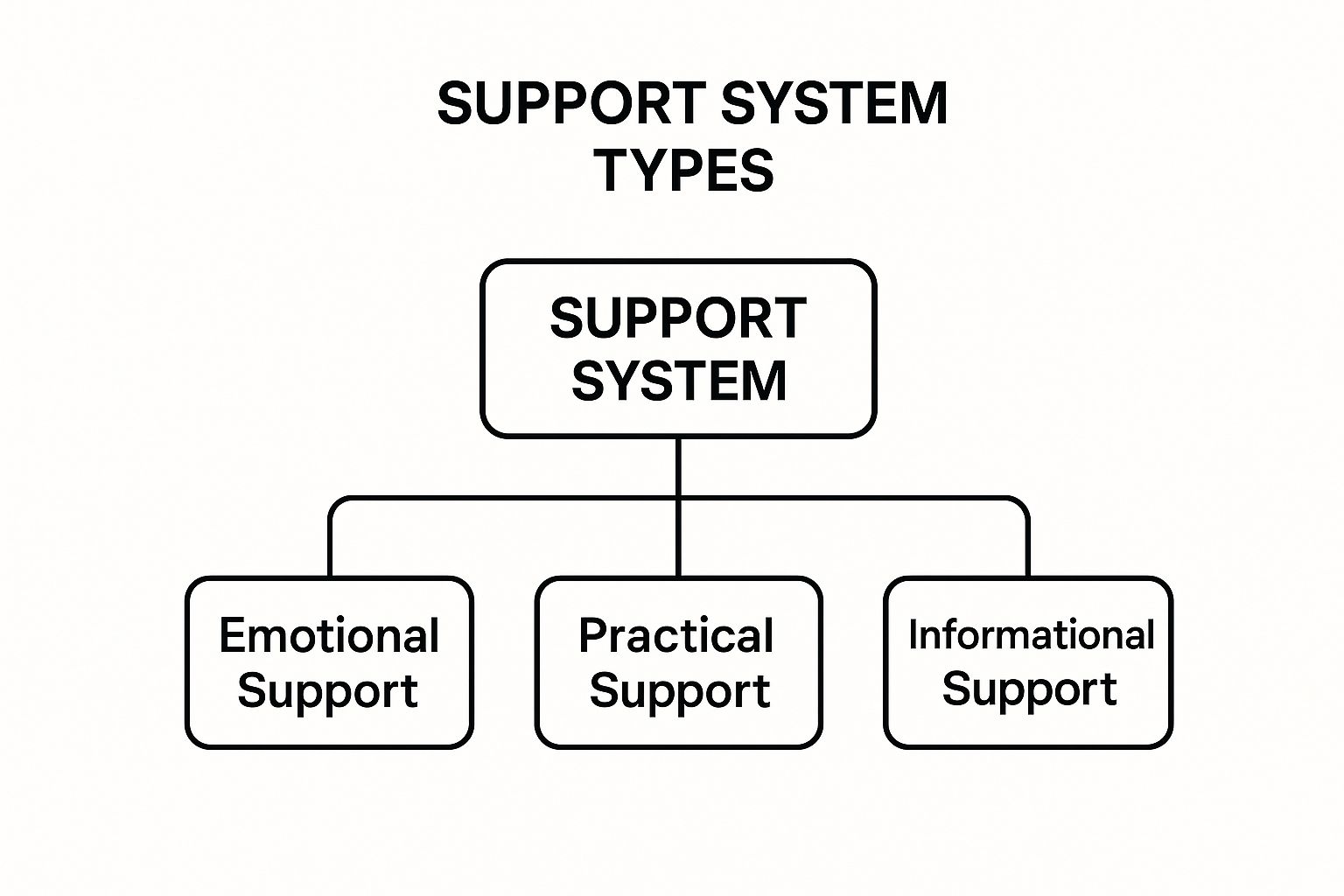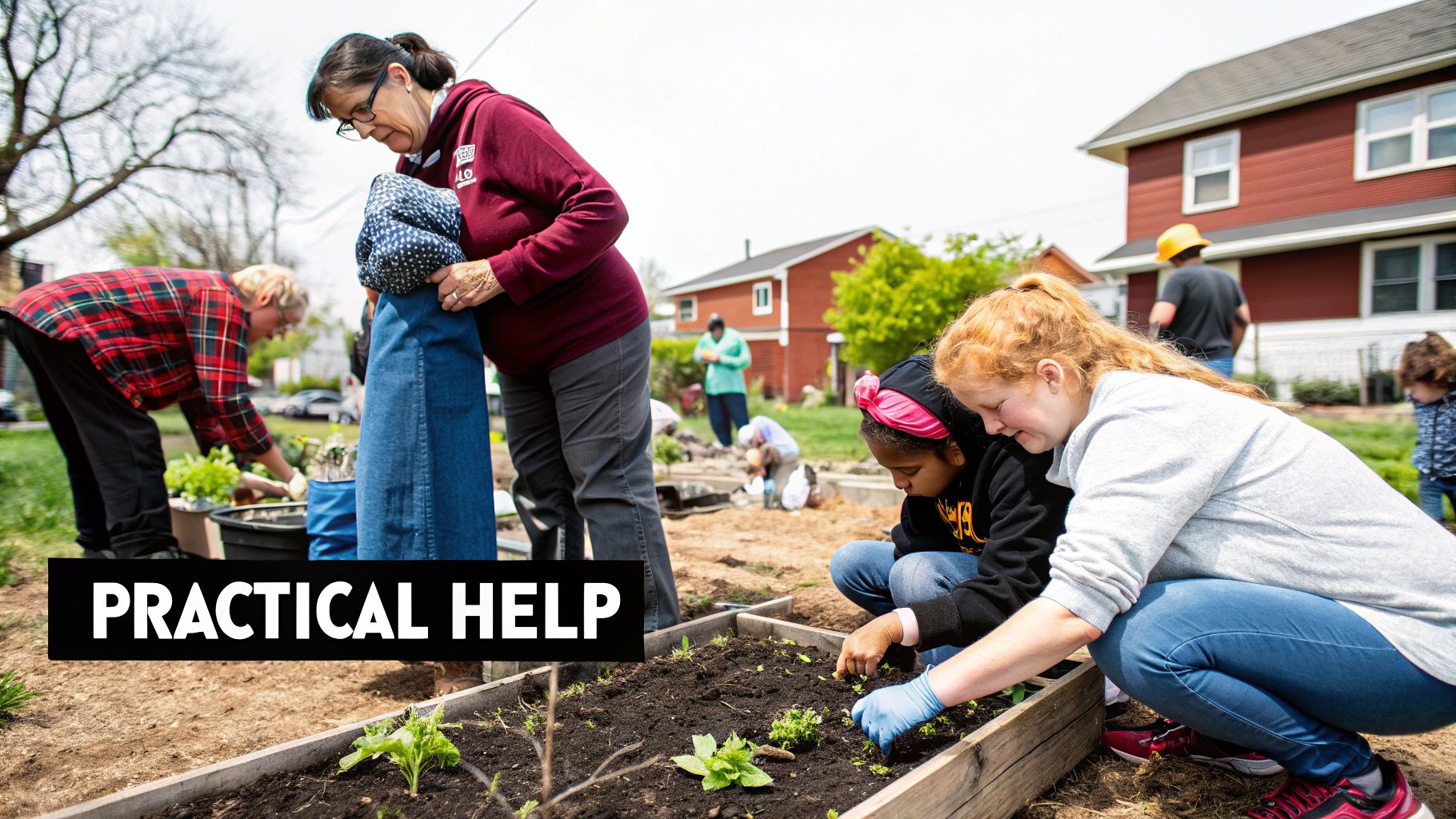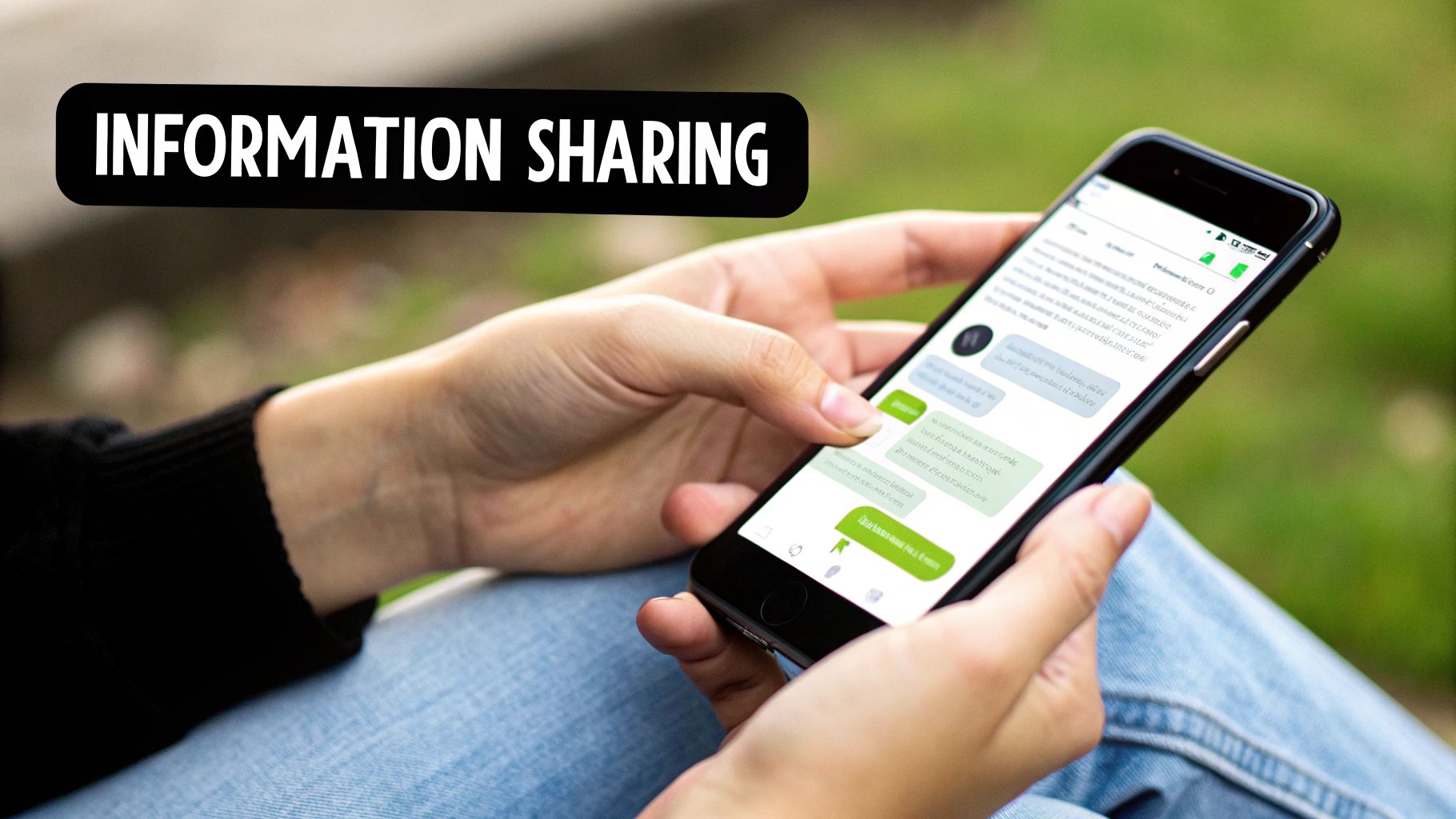Renew your life Today
When we talk about a support system, we're not just talking about a list of phone numbers you can call. We're talking about your personal network of people who provide real, tangible help—whether it’s emotional, practical, or informational.
Think of it like the scaffolding around a building under construction. It’s the structure that provides stability when things get shaky, gives you the strength to grow taller, and keeps you safe when you feel unsteady on your own two feet.
What Is a Support System, Really?
A support system is much more than just a collection of friends and family. It's a living, breathing web of relationships and resources you can count on for your well-being. This isn't some nice-to-have luxury; it's a foundational part of navigating life’s challenges, celebrating your wins, and keeping your mental and emotional equilibrium.
Imagine trying to build a house with nothing but a hammer. You might get a few things done, but it would be a frustrating, exhausting struggle. A strong support system is like having a complete toolbox—each person and resource inside it serves a different, crucial purpose. It's not about having dozens of friends, but about having the right kind of support for the moment you're in.
The Core Components of Support
A truly resilient network is built from different kinds of support that all work together. When you understand these categories, you can start to see where your own system is strong and where you might have a few gaps to fill.
- Emotional Support: This is all about empathy, trust, and genuine care. It’s the friend who listens to you vent without passing judgment, or the family member who offers a shoulder to cry on when you need it most.
- Practical Support: This is the hands-on, tangible help that eases life's logistical headaches. Think of a neighbor who helps you with a flat tire or a coworker who covers your shift during a family emergency.
- Informational Support: This is about guidance, solid advice, or just useful information. A mentor giving you career advice or a doctor clearly explaining a health condition are perfect examples of this in action.
A truly effective support system isn't passive; it's an active exchange of energy, help, and encouragement. Its strength lies in its diversity, with different people fulfilling different roles.
This visual breaks down the main types of support that create a complete, well-rounded system.

To really bring this to life, let's look at how these roles play out in our relationships.
The Core Roles Within Your Support Network
This table breaks down the essential types of support, showing how different people can fill these crucial roles in your life.
| Type of Support | What It Looks Like in Action | Who Might Provide It |
|---|---|---|
| The Listener | Offers a non-judgmental ear for venting and processing feelings. | Close friend, therapist, partner, sibling |
| The Cheerleader | Celebrates your wins, big and small, and reminds you of your strengths. | Mentor, supportive family member, best friend |
| The Advisor | Provides practical advice, shares knowledge, and offers new perspectives. | Mentor, experienced colleague, doctor, financial planner |
| The Helper | Steps in with tangible aid, like running errands or helping with a task. | Neighbor, coworker, trusted friend, family member |
| The Grounder | Offers a dose of reality and helps you stay level-headed. | A pragmatic friend, a long-time mentor |
| The Accountability Partner | Helps you stay on track with your goals and commitments. | A dedicated friend, a coach, a colleague with similar goals |
As you can see, these roles aren't rigid. A single person can be both a Listener and a Cheerleader, while another might be your go-to Advisor. The key is having a mix of these support types available to you.
As the diagram and table show, those three pillars—emotional, practical, and informational—are the foundation. But accountability is another critical element that often weaves through all three. To get a better sense of this specific role, it's worth exploring what an accountability partner does to keep you moving toward your goals.
The Different Kinds of Support You Can Have

Think of a truly resilient support system not as a single safety net, but as a rich tapestry woven from many different threads. You wouldn’t use a hammer for every household task, right? In the same way, you can’t rely on one person for every kind of support you need. When you start to recognize the diverse forms of help available, you can build a network that's far more balanced and robust.
Understanding what a support system really is means seeing these different types and knowing who fits where. Let's break down the main categories, which generally fall into two broad groups: informal and formal.
Informal Support: The People Closest to You
This is the kind of support that flows naturally from your personal relationships. It’s that organic, often unspoken network of friends, family, and community members who form the very backbone of your daily life.
These connections are built on shared history, mutual trust, and genuine affection. They’re your first line of defense against everyday stress and the go-to people for celebrating life's victories. Informal support is so powerful because it's personal and deeply rooted in who you are.
There are three key types of informal support:
- Emotional Support: This is the bedrock of feeling seen and understood. It’s the friend who just listens while you vent after a hard day, the partner who offers a comforting hug without saying a word, or the sibling who validates your feelings, making you feel less alone.
- Practical Support: You can think of this as tangible support—help that makes a real-world difference. This is your neighbor offering to watch the kids in an emergency, a coworker helping you get a project over the finish line, or a family member bringing over a meal when you're sick.
- Informational Support: This is the guidance and advice you get from trusted people in your orbit. It could be a mentor sharing career advice, a friend recommending a reliable mechanic, or a parent offering wisdom based on their own life experiences.
A healthy network is a blend of all these types. Leaning too heavily on one person for everything can lead to burnout, but appreciating the unique support each person offers strengthens all your relationships.
Formal Support: Professional and Structured Help
While your informal crew is essential, sometimes we need a kind of help that our personal network just isn't equipped to provide. This is where a formal support system comes into play. These are structured, professional, or organized resources designed to offer specialized assistance.
Formal support is often crucial for navigating more complex challenges, whether they relate to mental health, career development, or specific life situations. Professionals bring expertise and an objective perspective that friends and family can't always offer.
Examples of formal support include:
- Therapists and Counselors: These mental health professionals offer guided, evidence-based strategies for managing emotional and psychological challenges. They provide a safe, confidential space to explore your thoughts and feelings without judgment.
- Support Groups: Joining a group of people with shared experiences—like those managed by NAMI or the Depression & Bipolar Support Alliance (DBSA)—creates a powerful sense of community and mutual understanding. You realize you're not alone.
- Coaches and Mentors: A life coach, career coach, or professional mentor provides structured guidance to help you achieve specific goals. They offer accountability and expert insights to help you get from where you are to where you want to be.
Building a truly comprehensive support system means nurturing both your informal relationships and knowing when to seek formal help. By combining the personal warmth of friends and family with the structured expertise of professionals, you create an unshakable foundation for your well-being.
Why Your Connections Are Crucial for Your Health

It’s easy to think of our relationships as just a nice part of our social lives, but they’re so much more than that. They are a fundamental piece of your overall health puzzle. To truly understand what a support system is, you have to see the direct line connecting it to your mental, emotional, and even physical well-being. Think of these meaningful connections as a powerful shield against the curveballs life inevitably throws our way.
When you have people in your corner who make you feel genuinely seen, heard, and valued, something profound happens on a psychological level. This sense of belonging bolsters your self-esteem and builds the quiet confidence you need to face challenges head-on. Instead of feeling like you’re drifting alone, you feel anchored, which naturally fosters resilience and helps you develop healthier ways to cope.
The Science of Social Connection and Well-Being
The benefits of a strong support network aren't just feel-good ideas; they're backed by solid scientific evidence. Feeling socially connected can trigger real biological changes in your body, like reducing inflammation and boosting your immune system. On the flip side, loneliness is increasingly being linked to poor health outcomes on par with well-known risks like smoking or obesity.
A robust support system is your best defense against the damaging effects of chronic stress. When you have people to talk to and lean on, your body isn't stuck in a constant state of high alert. This emotional regulation is absolutely key to long-term health, protecting you from the gradual wear and tear that stress inflicts over time. The science behind building these lasting connections reveals just how much social influence can shape our habits and health for the better. You can learn more about the science behind building lasting connections in our detailed guide.
A strong support system doesn't just help you survive difficult times; it empowers you to thrive. It's a fundamental pillar of preventative health, safeguarding your mind and body against adversity.
Global Impact of Strong Support Systems
This isn’t just an individual phenomenon—the power of support extends to a global scale with a measurable impact. When entire communities and nations invest in social and health-related support structures, public health outcomes improve dramatically. These systems create a vital safety net that leads to longer, healthier lives for whole populations.
The World Health Organization highlights how effective support systems have helped an estimated 1.4 billion more people live healthier lives. For instance, between 2000 and 2023, maternal deaths plummeted by over 40%, and deaths of children under five were more than cut in half. This incredible progress shows the power of well-structured support, though it also reminds us that continued investment is crucial to keep moving forward. You can read about how support systems are improving global health on who.int.
How to Spot the Gaps in Your Support Network

Before you can build a stronger, more resilient support system, you have to be an honest architect of the one you have now. This means taking a clear-eyed look at your relationships to see where the structure is solid and where it’s starting to show some cracks. Pinpointing these gaps is the first, and most important, step you can take.
Think of your support network as a bridge. A sturdy bridge has several pillars, and each one carries a piece of the load. If one pillar starts to weaken, the others can pick up the slack. But if you’re depending on just one or two pillars for everything, the whole structure is at risk of collapse.
Recognizing the Warning Signs
Spotting the weak points in your network often starts with noticing certain feelings or situations that just won't go away. These are emotional red flags, signaling that something needs your attention. Do any of these hit a little too close to home?
- You feel persistently lonely, even when you're surrounded by people. This often points to a lack of deep, authentic connection where you feel truly seen and understood.
- You have no one to call in a sudden emergency. If you can’t immediately name someone who would drop everything to help you, your practical support is likely dangerously thin.
- You rely heavily on one person for everything. Leaning on a single friend, partner, or family member for all your emotional, practical, and social needs puts an immense, and unfair, strain on that relationship.
A critical part of understanding what a support system is involves recognizing that its strength comes from balance and diversity. Over-reliance on a single person is not a sign of a strong bond; it's a sign of a fragile network.
Taking an Honest Inventory of Your Connections
To get a clearer picture, it’s helpful to move beyond just feelings and ask yourself some direct questions. This honest self-assessment is the blueprint you need to start building. Think about the key people in your life and really reflect on these points.
Questions for Reflection:
- Who do you celebrate your wins with? Who is genuinely happy for your successes without making it about themselves?
- Who can you be completely vulnerable with? Who makes you feel safe enough to share your fears and failures without judgment?
- Who offers practical help when you're overwhelmed? Is there someone who would help you move, bring you soup when you’re sick, or give you a ride?
- Who gives you honest, constructive advice? This isn’t about finding a cheerleader, but about trusting someone to tell you the truth, even when it’s hard to hear.
Answering these questions will illuminate both the strengths and the real gaps in your support system. This clarity isn't meant to make you feel bad. It’s designed to empower you with a clear starting point for building the connections you truly need and deserve.
A Practical Guide to Building Your Support System
Now that you have a better sense of where your network might have gaps, it’s time for the empowering part—taking real, tangible steps to build the connections you deserve. Don't think of this as some huge, intimidating project. Instead, see it as a series of small, intentional acts that slowly but surely strengthen your personal scaffolding.
This is your action plan for creating a support system that genuinely lifts you up. Building these connections is a skill, and like any other, it gets better with practice. The key is to start small and focus on authentic connection, not just collecting contacts.
Start by Reconnecting and Nurturing What You Have
Often, the most powerful new connections are built on the foundations of old ones. Before you go searching for brand-new relationships, take a moment to look at who is already in your life or who has been a positive force in your past.
- Reach Out Authentically: Think of a friend you've lost touch with and send a simple, no-pressure message. A quick, "I was thinking about you the other day and just wanted to say hi" is often all it takes to reopen a door.
- Deepen Existing Ties: Pinpoint one or two casual friends or acquaintances you’d genuinely like to know better. Invite them for a coffee or a walk—something low-key that creates space for real conversation to flow.
- Schedule It In: In our busy lives, relationships can easily fall by the wayside if we're not careful. Make it a point to schedule a monthly call or a quarterly get-together with the people who truly matter.
Building a support system is a two-way street. The most rewarding connections are reciprocal. It's not just about what you can get, but about what you can give in return—your time, your attention, and your empathy.
Find Your Tribe by Following Your Passions
One of the most natural ways to meet like-minded people is to simply go where they are. When you join groups or activities centered around your genuine interests, it removes the awkward pressure of "networking" and replaces it with shared enthusiasm. Honing your interpersonal abilities, as detailed in this guide on building relationship skills, is a cornerstone of this entire process.
Consider a few of these avenues:
- Hobby Groups: Join a book club, a hiking group, a recreational sports team, or a cooking class.
- Volunteer Work: Dedicate your time to a cause you believe in. You’ll instantly connect with others who share your core values.
- Classes or Workshops: Sign up for a course at a local college or community center to learn a new skill alongside other curious minds.
For those who find in-person activities a bit challenging, exploring mindfulness practices can be a powerful way to build self-reliance, which is a crucial part of any strong support structure. You might find our guide on meditation to be a useful starting point for cultivating that inner calm.
Use Digital Tools to Foster Real Connections
Technology doesn't have to be a source of isolation; you can use it to enhance your personal support network. Think of it like this: The World Bank's Global Findex Database shows how digital connectivity has become a key support system for financial inclusion, with mobile tech becoming a lifeline for billions. You can use digital platforms in a similar way—not as a substitute for real connection, but as a bridge to it.
Of course. Here is the rewritten section, crafted to sound completely human-written and natural, following the style and tone of the provided examples.
Keeping Your Support System Strong for the Long Haul
So you've built a support system. That's a huge first step, but the real work—and the real reward—comes from keeping it strong over time. Think of your network less like a finished construction project and more like a garden. It needs consistent care, attention, and sometimes a little weeding to stay healthy and vibrant. Nurturing these vital connections is what ensures they'll be there for you through every season of your life.
This isn't about grand, occasional gestures. It’s the small, intentional things that show people you value them being in your corner. A simple thank-you text, remembering a big day for them, or offering your own ear when they need it—that’s the water and sunlight that helps these relationships truly flourish.
The Give and Take of Healthy Bonds
At its heart, a healthy support system is a two-way street. It’s built on a foundation of reciprocity, where the give and take of support feels balanced and natural over the long run. This also means you have to set healthy boundaries to protect your own energy. It’s the only way to avoid the burnout that inevitably comes from one-sided relationships.
Making a habit of checking in is a simple but incredibly powerful practice. A quick message asking, “How are you, really?” reinforces the bond and keeps the lines of communication wide open. Life is always in flux, and so are our relationships. It’s completely normal for some connections to shift or fade.
The goal isn't to cling to every relationship forever, but to cultivate a network that grows and evolves with you. This means having the grace to let connections go when they no longer feel right, while always staying open to new people who enter your life.
Inevitably, challenges will pop up even in the strongest networks. Knowing how to navigate difficult patches, including understanding how to rebuild trust in a relationship, is essential for the long-term health of your bonds. This adaptability is what makes a support system truly resilient.
Ultimately, maintaining your network is a profound act of self-care. When you invest time and energy into the people who lift you up, you are actively tending to your own well-being. This ensures that no matter what life throws your way—the celebrations or the struggles—you'll have a strong, reliable, and loving group of people to share it all with.
Common Questions About Building a Support System
The idea of intentionally building a support system can feel a bit strange at first. It’s completely normal for it to bring up some practical questions and maybe even a little self-doubt. Let's walk through the most common hurdles with some clear, real-world answers to help you get started with confidence.
What if I’m Too Introverted to Build a Big Network?
This is a worry I hear all the time, but let's be clear: building a support system isn't a popularity contest or an activity reserved for extroverts. The real goal here is quality over quantity. Honestly, a small, solid network with just one or two people you can genuinely count on is worth far more than having dozens of superficial connections.
Instead of trying to meet a bunch of new people, focus on going deeper with the relationships you already have. You can also look for low-pressure spots to connect with others, like online communities or small local groups built around your hobbies. These places often feel less intimidating and let connections grow naturally from a shared passion.
For an introvert, building a support system is about finding your comfort zone. It’s about nurturing deep roots with a few key people, not casting a wide, shallow net.
How Do I Ask for Help Without Feeling Like a Burden?
That fear of being a burden is a powerful one, and it stops so many of us from reaching out when we need it most. The secret to getting past this is to be specific with your request and show that you respect the other person's time and energy. A vague cry for help can feel overwhelming for the person on the receiving end.
Think about the difference. Instead of just saying, “I’m so stressed out, I need help,” you could try something much more concrete, like, “Would you have 20 minutes to just listen while I talk through a problem I'm stuck on?” The people who care about you genuinely want to help; they often feel honored that you trust them enough to ask. And remember, support is a two-way street. Being there for them when you can creates a balanced, healthy relationship where no one feels like a burden.
Does a Therapist Count as Part of My Support System?
Absolutely. In fact, they are a critical piece of the puzzle. A formal support system, which includes professionals like therapists, doctors, or coaches, is an incredibly powerful—and often essential—part of a well-rounded network. They bring an objective, specialized kind of support that our friends and family, as much as they love us, might not be equipped to provide.
When you combine this professional guidance with the emotional backing from your personal connections, you build an even stronger, more resilient foundation for your well-being. This is especially true when navigating particularly tough times, which is why we put together a guide on how to handle depression on holidays and other stressful periods.
At Curemindset Ltd, we believe in empowering you with the tools to build mental resilience. Our expertly designed courses and resources are created to help you understand your emotional needs and cultivate a healthier, more balanced life. Explore our mental wellness tools today.
Article created using Outrank


